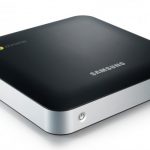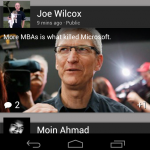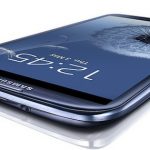Samsung Series 5 550 Chromebook first-impressions review

Today, Google and Samsung officially launch the second-generation Chromebook, starting with the Series 5 550, which like its predecessor comes in WiFi-only and 3G combo models. I had the pleasure of using the new Chromebook for the past week as my only PC. The overall user experience is surprisingly satisfying and refreshing. In a computer market dominated by Mac and Windows, Chromebook is freedom from duopolies that define the experience within walled gardens and around desktop applications. But changes introduced with Chrome OS 19 make the user experience much more desktop-like, as Google cedes some of the browser motif for familiarity and usability, with multitasking being high among the reasons.
If you read no further, the answer to your question is this: Yes, you can use Chromebook Series 5 550 as your primary, and only, PC. Google has succeeded offering online and offline capabilities balanced to most computing needs, while keeping cloud benefits primary but seamlessly integrated. For two months last summer, I used the original Samsung Series 5 Chromebook as my primary PC, in the first weeks and as my only one later on. I'll repeat the experiment at least through the end of June, and I might not go back -- strange, considering new OS X and Windows versions debut within months. That commitment says much about my positive first impressions.
Meet Samsung Series 3 Chromebox

Chrome OS is taking up new residence. Today Google and Samsung launch Chromebox, a Mac mini-like computer to which buyers attach keyboard, mouse and monitor. The idea isn't novel: Users keep their existing peripherals while upgrading hardware and migrating to a spanking new operating system. For anyone looking to get off the OS X or Windows train, Chromebox proves to be an affordable alternative running Google's browser-boasting, cloud-connected Linux-based OS.
Samsung Series 3 Chromebox joins Samsung's second-generation Chromebook, the Series 5 500, also launched today, and it's a bargain by comparison -- $329 versus $449 for WiFi-only laptop and $549 for 3G combo. The chromebox also sports a faster processor, 1.9GHz vs 1.3GHz for Chromebook. The cloud-computing device, now with loads of local functionality and storage, is well-suited for educational institutions and small businesses.
Why aren't you reading this story on Samsung Galaxy S III?

If you live in parts of Europe, the Middle East or Asia, arguably the hottest smartphone on the planet is selling out fast, and, whoa, it's not iPhone 4S. May 29 dawned on the continent to a new day for Samsung smartphones and sunset for Apple's flagship, which is oh-so similar to the one released in early 2010. Buyers looking for freedom from the walled garden or simply stunning software innovation can choose to "think different", borrowing the long-discarded Apple marketing phrase.
Twenty-six days ago, I asked: "Is iPhone 4 obsolete?" Nearly 2,000 of you answered "Yes" -- that's 65 percent -- by saying you will buy Galaxy S III. Now remains the question: How many of you planning to buy, really will do so?
Is Apple right to ban Airfoil Speakers Touch?

If you want a gander at one of iOS 6's new features, just ask developer Rogue Amoeba. Apple unceremoniously pulled Airfoil Speakers Touch, which has been in the iOS App Store since 2009. In the past, the company has refused apps or pulled others that compete with Apple repeat functionality iOS offers. The ban hints at streaming capabilities coming in the next version, while raising questions about appropriateness or fairness. Hence the question to you: Is Apple right to ban Airfoil Speakers Touch?
"Today, we’ve been informed that Apple has removed Airfoil Speakers Touch from the iOS App Store", CEO Paul Kafasis says. "We first heard from Apple about this decision two days ago, and we’ve been discussing the pending removal with them since then. However, we still do not yet have a clear answer on why Apple has chosen to remove Airfoil Speakers Touch. Needless to say, we’re quite disappointed with their decision, and we’re working hard to once again make the application available for you, our users." Apple had already approved the removed version.
Who says Google promotes piracy?

Perhaps the question should be: Who doesn't? Google search is a powerful tool for finding content of any kind, including copyrighted material posted without permission. Today Google sets the record straight, by releasing the URLs copyright holders request removed from search: 1,246,713 over the last month. These came from more than 1,000 copyright holders directed at about 24,000 domains.
Apparently more details about other copyright areas will come later. For now, search is priority, with Google planning to update requests daily. The report available on Wednesday offers data through yesterday.
Google+ for Android catches up with iPhone

Well, perhaps I should qualify that with "almost", depending on what matters more to you as a user. On Thursday, 15 days after releasing a major Google+ update for iPhone, the Android version arrived. Timing is interesting. According to NPD, considerably more Android users access Google+ from the browser than the app -- 16 percent to 10 percent overall reach, in March, respectively. My question for you quick downloaders, will that be true for you, or is the app now preferred? It's no idle question, because the web experience is now so vastly different from the app.
Like its counterpart, Google+ for Android offers bleeding-edge photos. Pretty much everything about Google+ bleeds the edge of the screen. The effect is immersive. You just want to scroll and scroll -- and you will since so much less content fills the screen now. But the Android version has better visual flow than its iOS counterpart. Stated differently: It's snappier, more alive. "We're building for a mobile future", Google senior veep Vic Gundotra says. That's apparent from just how different the app is from the web experience -- and how immersive.
Geeks rejoice at Google's legal triumph over Oracle

Google couldn't have asked for better in its intellectual property dispute with Oracle. The judge turned out to be a programmer, and his ongoing guidance to the jury tempered deliberations. Then there were a couple of lucky breaks, the biggest perhaps from former Sun CEO Jonathan Schwartz, who volunteered on the witness stand the company saw no grounds to sue Google. Wherever the luck, and perhaps a tenable defense, Google won big today with the jury finding that Android doesn't violate Oracle patents acquired from Sun.
The reaction, as measured by Google+ posts, is magnanimous for the search giant -- and, well, as for Oracle it's best not to whack the beaten too much more. I chose to take reaction from Google+ because it's such a techie hangout.
Who will buy Samsung Galaxy S III?

Samsung starts selling its third-generation S Series smartphone next week -- May 29, although some locales are expected to get it a day earlier (if not sooner). Our BetaNews poll, "Will you buy Samsung Galaxy S III", has enough responses -- 2,361, as I write -- to report results. Cut to the point: 36.59 percent of you won't buy the S3. At least among our tech community, there is huge interest in the smartphone, which is now available for preorders here, including Amazon.
Some of you have preordered, or will do so: 15.37 percent. Another 32.57 percent plan to order within 3 months and 9.45 percent within 6 months. Those willing to wait are likely to pay less, as national cellular carriers offer Galaxy S 3, albeit locked. The pricier, unlocked models are carrier and contract free. The poll results corroborate last week's report of 9 million preorders. In the United Kingdom, Carphone Warehouse reports strong preorder demand for the S3.
Are Facebook bankers backers or backstabbers?

What's the measure of Facebook's IPO? MBAOnline sent us a couple of infographics explaining just that (see them below the fold). But I must qualify that they don't take into account downward trends and some nasty behind-the-scenes backstabbing. Late yesterday, writing for Reuters, Alistair Barr reports that ahead of Facebook's Friday IPO, lead underwriter Morgan Stanley reduced revenue forecasts during the roadshow promoting the public offering. JPMorgan Chase and Goldman Sachs did similarly.
Fallen dot-com stock analyst and risen tech news publisher Henry Blodget adds perspective. "This by itself is highly unusual (I've never seen it during 20 years in and around the tech IPO business)", he observes. "But, just as important, news of the estimate cut was passed on only to a handful of big investor clients, not everyone else who was considering an investment in Facebook". Uh-oh, selective disclosure violates SEC rules.
Larry Page: 'Motorola is a great American tech company'

Googorola is now a reality. Today, Google formally completed its Motorola acquisition, after completing the final hurdle, approval from China, over the weekend. The approval came with conditions -- that Google keep Android open for at least 5 years -- but the company had been on that track anyway.
Motorola is a big purchase, $12.5 billion, initiated in August 2011. With Motorola, Google gets an enormous cache of patents -- pending and approved around 24,000; enormous wealth in cellular research and development, manufacturing operations; and a heap load of headaches. Over the weekend, for example, International Trade Commission blocked entry to a majority of Motorola mobile products for violating a single Microsoft patent.
Google mind reading comes to Gmail

I'm not the biggest Gmail fan. Sure, I use the service, but my inbox fills up too fast, and managing the madness is measured procrastination. Email in general is the problem; Google's service is simply easy to blame. But a new enhancement coming in days has me finally ready to adapt behavior to attitude -- and stop being the email file clerk.
Google is in process of adding nifty contextual, autocomplete capabilities to Gmail -- that is if you find this kind of soothsaying useful. I confess to making more typing errors when Google search autocomplete tries to anticipate my thoughts. Mind reader it is not enough, so what good is all that information Google supposedly collects about us all? :) As for Gmail, the new autocomplete starts with what you've got.
Tell me, in what alternative universe does Chrome usage surpass Internet Explorer?

Surely it can't be this one, but that's what StatCounter's weekly report would have you believe. Can it be true? Has IE really fallen so low and Chrome come so far? That's my question for you, as we revive our browser usage poll.
For the week May 14-20, IE global usage share is 31.94 percent compared to 32.76 percent for Chrome. This change in leadership comes after a May 1 methodology adjustment that should penalize Chrome. Google's browser pre-renders pages to speed up search, but not all are viewed. StatCounter now adjusts for them. I must say that StatCounter's data dramatically differs from Net Applications', which on May 1 put Chrome third to Firefox and IE usage about three times more.
Is Google+ gaining against Facebook on Android?

Ahead of Facebook's Friday IPO, NPD released usage data for Android smartphones. Unsurprisingly, user reach is quite high. In looking over the data, I honed in on Google+, which makes a surprising showing for a social network not even a year old. But behind early adoption is a lesson for Google and Android developers about the app vs browser.
First, the data NPD highlights: Nearly 75 percent of Android users accessed Facebook, via app or browser, in March. But, separately for both, reach declined from February to March. However, the overall trend for the app is up. By comparison, Twitter: 23 percent web, 16 percent app. Google+ reach is 16 percent web, with the app swinging between 10 percent and 15 percent. For all three social networks, web reach exceeds the app.
iPhone meets its match

Finally, initial sales of another smartphone smoke iPhone -- that is if leaked numbers prove true. Samsung Galaxy S III goes on sale in 11 days, but preorders reportedly already top 9 million. By comparison, the much-lauded iPhone 4S sold 4 million units, including preorders, during its first three days of availability. At this pace, Galaxy S III is poised to be the biggest smartphone launch to date.
Samsung announced the smartphone on May 3, when I asked: "Is iPhone 4S obsolete?" Surely someone thinks so, and their answer should chill the hearts of Apple apologists and investors. Samsung, not Apple, is the rising star in the cloud-connected device firmament. Perhaps iPhone 5 will change matters. But for now, Samsung, propelled by the Galaxy S brand, broad channel distribution and smart software innovation, is brightest star.
Will you make Mark Zuckerberg rich?

Stated differently: Will you invest in Facebook? The third-largest IPO in history begins today. Facebook set a price of $38 share, which values the social network at about $104 billion. Twenty-eight year-old cofounder and CEO Mark Zuckerberg will be super wealthy, if Facebook gets its price (and likely much more) as I post ahead of the market's open.
Facebook makes available 421.2 million shares. Zuckerberg maintains voting majority, 503.6 million, which at $38 is $19.1 billion, making him the 29th richest person -- wealthier than Google's cofounders.
Joe's Bio
Joe Wilcox is BetaNews executive editor. His motto: Change the rules. Joe is a former CNET News staff writer, JupiterResearch senior analyst, and Ziff Davis Enterprise Microsoft Watch editor.
Ethics StatementBetaNews, your source for breaking tech news, reviews, and in-depth reporting since 1998.
© 1998-2025 BetaNews, Inc. All Rights Reserved. About Us - Privacy Policy - Cookie Policy - Sitemap.
